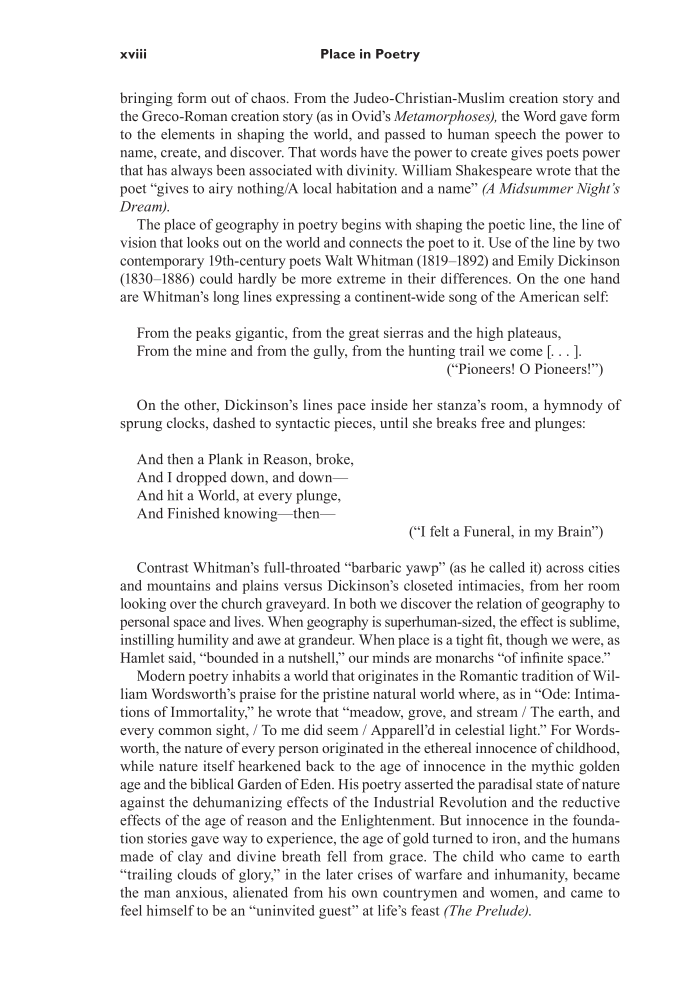xviii Place in Poetry bringing form out of chaos. From the Judeo-Christian-Muslim creation story and the Greco- Roman creation story (as in Ovid’s Metamorphoses), the Word gave form to the elements in shaping the world, and passed to human speech the power to name, create, and discover. That words have the power to create gives poets power that has always been associated with divinity. William Shakespeare wrote that the poet “gives to airy nothing/A local habitation and a name” (A Midsummer Night’s Dream). The place of geography in poetry begins with shaping the poetic line, the line of vision that looks out on the world and connects the poet to it. Use of the line by two con temporary 19th- century poets Walt Whitman (1819–1892) and Emily Dickinson (1830–1886) could hardly be more extreme in their differences. On the one hand are Whitman’s long lines expressing a continent-wide song of the American self: From the peaks gigantic, from the great sierras and the high plateaus, From the mine and from the gully, from the hunting trail we come [. . . ]. (“Pioneers! O Pioneers!”) On the other, Dickinson’s lines pace inside her stanza’s room, a hymnody of sprung clocks, dashed to syntactic pieces, until she breaks free and plunges: And then a Plank in Reason, broke, And I dropped down, and down— And hit a World, at every plunge, And Finished knowing—then— (“I felt a Funeral, in my Brain”) Contrast Whitman’s full- throated “barbaric yawp” (as he called it) across cities and mountains and plains versus Dickinson’s closeted intimacies, from her room looking over the church graveyard. In both we discover the relation of geography to personal space and lives. When geography is superhuman-sized, the effect is sublime, instilling humility and awe at grandeur. When place is a tight fit, though we were, as Hamlet said, “bounded in a nutshell,” our minds are monarchs “of infinite space.” Modern poetry inhabits a world that originates in the Romantic tradition of Wil- liam Wordsworth’s praise for the pristine natural world where, as in “Ode: Intima- tions of Immortality,” he wrote that “meadow, grove, and stream / The earth, and every common sight, / To me did seem / Apparell’d in celestial light.” For Words worth, the nature of every person originated in the ethereal innocence of childhood, while nature itself hearkened back to the age of innocence in the mythic golden age and the biblical Garden of Eden. His poetry asserted the paradisal state of nature against the dehumanizing effects of the Industrial Revolution and the reductive effects of the age of reason and the Enlightenment. But innocence in the founda- tion stories gave way to experience, the age of gold turned to iron, and the humans made of clay and divine breath fell from grace. The child who came to earth “trailing clouds of glory,” in the later crises of warfare and inhumanity, became the man anxious, alienated from his own countrymen and women, and came to feel himself to be an “uninvited guest” at life’s feast (The Prelude).
Document Details My Account Print multiple pages
Print
You have printed 0 times in the last 24 hours.
Your print count will reset on at .
You may print 0 more time(s) before then.
You may print a maximum of 0 pages at a time.

























































































































































































































































































































































































































